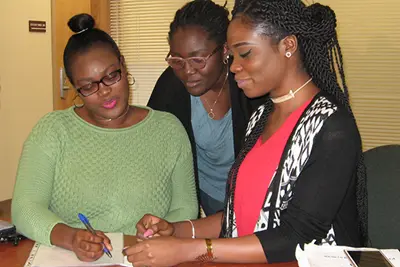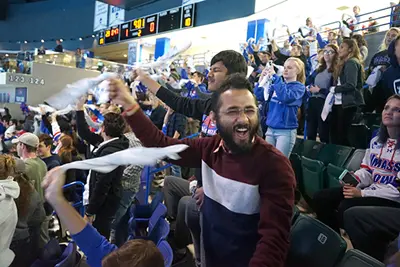America East Man of the Year Mentored 20 DC-CAP Scholars
 Image by UML Athletics
Image by UML Athletics
08/13/2020
By Katharine Webster
On and off the basketball court, America East Man of the Year Christian Lutete ’19 ’20 sets a quiet but inspiring example, his coaches, professors and friends say.
Lutete, who won the America East honor for his academic accomplishments and community work as well as his performance on the team and leadership as captain, loves basketball for its own sake. He also knows it has brought him many opportunities that others don’t get — and he wants to bring those opportunities to other young people as part of his commitment to racial and social justice.
He got his chance last year when he fulfilled the practicum requirement for his master’s degree in peace and conflict studies by serving as a peer mentor to 20 students of color who came to UMass Lowell on academic merit scholarships from the Washington, D.C., public schools, which he’d also attended.
“He’s like the big brother I didn’t have growing up. And in basketball alone, he scored 51 points (against Long Island University). That’s ridiculous!” says Kevin Akers, a mechanical engineering major who is in the first cohort of DC-CAP Scholars, a partnership between the District of Columbia College Access Program (DC-CAP), the Leonsis Foundation and the university.
“He was able to motivate people without overstepping in any way. He keeps a very calm attitude; he keeps everything positive; he’s just an overall great person,” Akers says.
Lutete says that mentoring the first-year students was a highlight of his UMass Lowell career.
 Image by Courtesy
Image by Courtesy
“I could understand what they were going through, the culture shock. They’re going straight from high school in a community that’s mostly African American to college at a school that’s predominantly white — and they’re eight- to nine-hours drive away, so they can’t just go home on the weekend,” he says.
Lutete went through the same culture shock himself when, after graduating from McKinley Technological High School, the STEM high school in Washington, D.C., he accepted a basketball scholarship for a post-graduate year at Phillips Exeter Academy in Exeter, N.H.
“It’s one of the best decisions I made because it made me uncomfortable, and that’s what I really needed at that age,” he says. “In the moment, you don’t think it’s a good thing. But when I went home, I could see how I had grown. That’s how growth comes: through exposure and feeling uncomfortable.”
Lutete was recruited by Ivy League colleges, but he decided to go to Radford University in Virginia, where he majored in computer science. He says basketball didn’t work out for him there, and he began to lose confidence in himself, although he kept working hard on and off the court.
When he decided to transfer, he looked at UMass Lowell because a high school teammate of his, Rinardo Perry, was playing for the River Hawks. UML offered Lutete a full scholarship and accepted all of his academic credits, so he took a leap of faith and came north again. He was red-shirted for a year, but it felt like a fresh start.
He also changed his major to economics, which worked better with his basketball schedule — and because he had always been interested in the underpinnings of business and the markets.
“I really liked my economics teachers and my classmates,” he says. “They were all so supportive of me. They’d come to my games, and when you see your classmates and your teachers being so supportive of you, it just makes you want to work even harder in the classroom.”
Where economics gave him a solid foundation, the graduate program in peace and conflict studies challenged him to get creative and think more abstractly — and allowed him to focus on racial and social justice by customizing his classes.
“It teaches you how to deal with conflict and still get your point across. You learn about great leaders, like Gandhi and Martin Luther King Jr.,” he says. “There were people of multiple ages and backgrounds in my classes. And doing the practicum, that’s when I began to blossom.”
 Image by Austin Mariasy
Image by Austin Mariasy
Assoc. Director of Multicultural AffairsFrancine Coston, who runs the DC-CAP Scholars program at UMass Lowell, says Lutete provided a crucial link between the students and university administrators.
“When we had a meeting, he’d walk into the room and say, ‘Hello, family!’ and they’d all want to talk with him,” Coston says. “He made a huge difference in helping them to transition by making them feel that it’s OK to ask for help if you need it and letting them know that it’s OK to make mistakes; not everything’s going to work out just the way you planned.”
Lutete was also a social anchor, providing a sense of home and community for the DC-CAP Scholars, Coston says. He welcomed them to hang out with him and his friends, in his room and in the gym.
He also connected his DC-CAP “family” with his basketball family. Before last year’s season began, he organized a dinner for the DC-CAP Scholars to meet three assistant men’s and women’s basketball coaches, two from the D.C.-Maryland area and one from New Orleans. All three — Louis Hinnant, Biko Paris and Denise King — had taken a similar path, going to New England colleges on basketball scholarships.
“These adults were once in their shoes, not far from their age, and faced the same challenges,” Lutete says. “I wanted the students to understand that it’s not just them: There are people on this campus they can identify with and they have more avenues of support.”
After that, the DC-CAP Scholars tried to come to all of Lutete’s home games, as well as the women’s basketball games.
Paris says that Lutete left a legacy as captain of the men’s basketball team, too, leading by example with his phenomenal work ethic. Lutete, who is left-handed, even broke his left wrist senior year, but didn’t tell anyone until the season ended. After surgery, he was back in the gym, left hand in a cast, working on his right-handed shots, Paris says.
“He’s the first one in the gym and he’s the last one to leave the gym. But he never talks about himself; he’s not out to promote himself. He’s just a super-smart kid who knows what he wants in life,” Paris says.
Ultimately, Lutete plans to work with urban children and young people to help them get the same kinds of opportunities, encouragement and support that he has received. In the meantime, he has signed to play for BC CSU Sibiu, a pro basketball club in Sibiu, Romania. He appreciates the chance to play professionally and is looking forward to a new adventure.
While he waits to hear when practices will start, he’s back home with his family in Silver Springs, Md., staying in touch with his DC-CAP Scholar brothers and sisters and practicing for hours every day.
“I love working on my game. When it’s just you and the basketball, and you can hear the swish when you make a basket, or you can hear the rhythm of the dribble, it’s almost like a meditation,” he says. “You’re locked into the moment, what you want to achieve, what you want to work on. Nothing else matters.”




